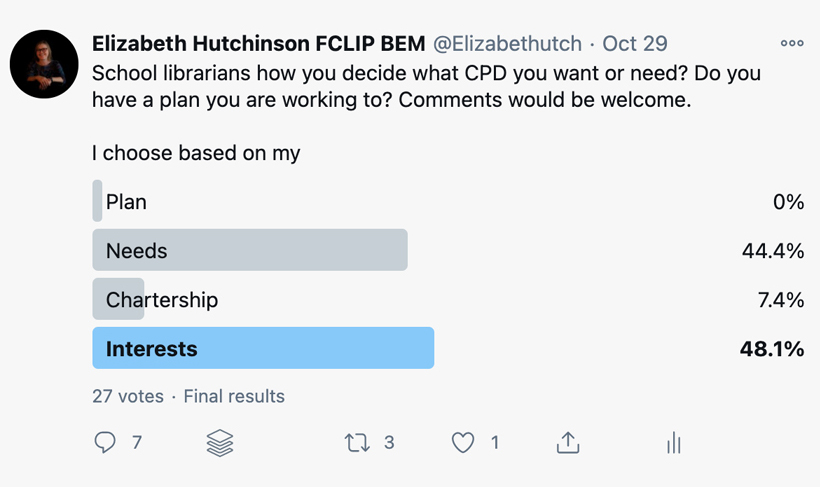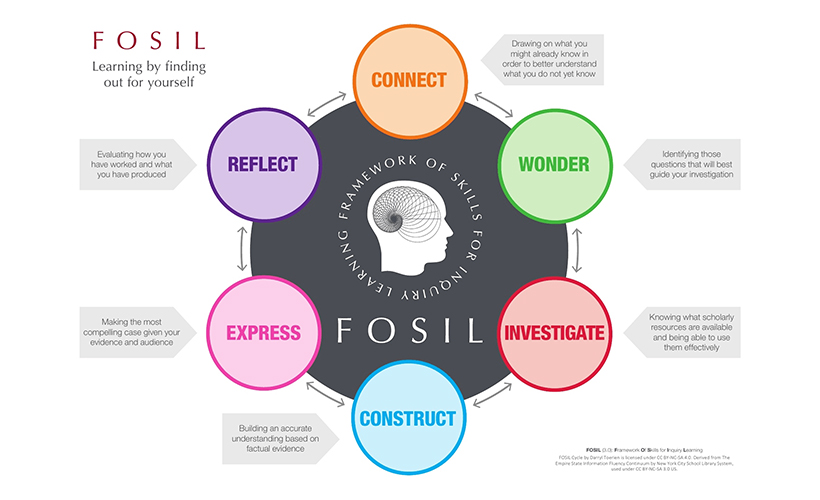It might seem trivial to talk about professional development when the world is in crisis, but it feels important to focus on something good at the end of this year. Strangely, coronavirus provided unexpected learning opportunities that were not available 12 months ago. It opened the door for school librarians to access professional development online, which was not only cost-effective but also provided opportunities to learn all sorts of concepts and ideas from professionals who are usually beyond their reach.
If you were anything like me, I sometimes felt a little overwhelmed by what was on offer and sometimes found it difficult to choose what was important for me. However, in searching for what I needed I realised that it was an opportunity for me, too. As with most of my ideas, I like to act quickly and soon found myself presenting webinars for the SLA (School Library Association). This was when I decided to try running some of my own online training, but I needed a focus. I chose two things, IFLA (International Federation of Library Association and Institutions) School Library Guidelines, and FOSIL (Framework Of Skills for Inquiry Learning).
Why IFLA and FOSIL?
I have worked as a school librarian and also talk to school librarians now, and the same theme crops up time after time. There just is not enough time in the day to do everything that is being asked of them. School librarians are “yes” people, and I know this because I was one, too. I was so happy to be asked to do something for someone, especially teachers, that I would find time even if it did not really fit into my role. Why was this? Mainly because no-one, including myself, really knew what my role was. At the time I had an essence of what I was expected to do. This was to engage students in Reading for Pleasure and support students and teachers through teaching information literacy. I was absolutely convinced that the only way to do this well was to help them embed information literacy within the curriculum. Unfortunately, I didn’t have an information literacy framework or a plan, so I became a yes person.
Why Don’t We Know What School Librarians Do?
How do school librarians know what they should be doing? Where is the guidance? Where is the framework that a new school librarian or headteacher can turn to, to find out? How do they learn about what they are supposed to be doing and, above all, how can they learn how to say no, so they can say yes to what they know is important?
In some parts of the world, including the U.K., there is no statutory obligation for schools to have school libraries, so where would you find out what school librarians should be doing? SLA and CILIP SLG (Chartered Institute of Library and Information Professionals, School Library Group) both provide support and training; however, it is very difficult to decide on your training needs when there is no legal obligation to even have a library or librarian. I ran a poll on Twitter asking school librarians how they decided on what professional development they needed, and the results, although small, were telling.

No-one was working to a plan, and only just over 7% were focused on Chartership, which is a professional qualification offered by CILIP. However, over 92% were focusing their CPD on their interests and needs. Why is this a problem? I fear that this will keep them within the bubble they have created for themselves. For example, if a school librarian and the school they work for believe the librarian’s role is to focus on Reading for Pleasure, why would they search out and look for CPD on Teaching through Inquiry or Media and Information literacy? If there is no guidance about what they should/could be doing, I fear there is no possibility of changing this.
Why Do We Need to Change This?
It seems like it is a catch 22. If no one knows what school librarians do and no-one offers a plan of action, why would anyone care? There are plenty of others who are prepared to do a school librarian’s job for less money, too. We have seen it happen already. Why do you need to pay professional wages for someone to run a school library and encourage children to read for pleasure? I know the work that goes into this, but the majority of people looking for a term-time job really don’t, until they land in a school library and the reality hits. I also know that a lot of people who end up in school libraries this way do a very professional job in very difficult circumstances whilst learning on the job. Many end up doing far more than they are being paid to do because they realise the importance of the school librarian’s role. We also must consider the other areas of school librarianship, Media and Information Literacy instruction and a role in inquiry-based learning. How does someone learn how to do this if there is no guidance or clarification of a school librarian’s role? I believe that if we do nothing, school libraries simply will not exist in the future.
What Can We Do?
It was important for me to find something that would explore the role of the school librarian but also help school librarians explain what they do. I was very lucky to be directed to the IFLA School Library Guidelines by Darryl Toerien, creator of FOSIL, and it all then began to fall into place. This international team of librarians with over 60 years of experience have clearly outlined the core activities of the school librarian, and so my focus and training became very clear. The five core instructional activities are listed as these:
- Literacy and reader development
- Media and info lit instruction
- Inquiry-based learning models
- Technology integration
- Professional development for teachers
I was already learning about FOSIL (Framework Of Skills for Inquiry Learning), which looks at the bigger picture of media and information literacy within inquiry. I realised I had a starting point within the IFLA School Library Guidelines, and it grew from there. My training now is very carefully grounded around FOSIL and IFLA, giving me the ability to help school librarians focus on the five core activities and how they can centre themselves in teaching and learning.
Why Do We Need to Focus on Inquiry and Not Just Information Literacy?
Information literacy is hugely important to school librarians and can be found within inquiry, but it is not enough to be all that school librarians focus on. “Inquiry is about developing personal meaning connected to prior knowledge, not accumulating information or adopting someone else’s knowledge,” and school librarians need to move on from teaching the “traditional library skills of locating resources and creating a bibliography” (Stripling, 2017). It is time to plant school librarians into the heart of teaching and learning through the curriculum and through inquiry.
Why Focus on Only One Inquiry Model?
I often get asked why I focus so much on FOSIL. Why talk so often about one model of inquiry when there are others available? I choose to focus on one model as I have found something that is well researched, up to date, and has been endorsed by some of the most highly regarded educators in the field of inquiry learning, including Barbara Stripling. It takes time and effort to engage and understand one model. I am offering my time to support school librarians who may have never used a framework or are interested in knowing more. It would be impossible to do this if I had not chosen one myself. My choice of FOSIL is not exclusive, but as it is my tool of choice when I talk about research skills or inquiry learning, you will hear me talk about FOSIL because that is where my expertise lies and this makes sense to me.
How Does This Give School Librarians Focus?
Once I started to use and understand FOSIL myself, the conversations I had with teachers were so much easier than when I was talking “information literacy,” and I want to share this with others through my training. This easy-to-follow cycle was my foot in the door.
Inquiry covers a broad spectrum of school librarianship, whilst also fitting well into the school curriculum. It opens doors to teaching and learning and space for the school librarians to support and demonstrate their expertise. The FOSIL group website has numerous resources to help teachers and school librarians get started. It is all completely free and can be used and adapted by anyone as long as credit is given. There is also a forum where you can ask for help and advice but also post about what you are doing within your schools.
Originally published on Elizabeth Hutchinson’s blog.
References
Stripling, Barbara K. “Empowering Students to Inquire in a Digital Environment.” School Library Connection, February 2021, schoollibraryconnection.com/Home/Display/2254698?topicCenterId=2252404.
See also:




